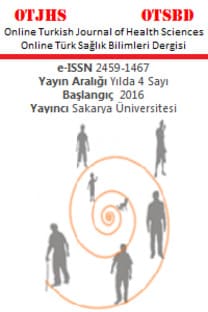Gebelikte Sigara Kullanımının Prenatal Bağlanmaya Etkisi
Gebelik, prenatal bağlanma, sigara içme
The Effect of Smoking During Pregnancy on Prenatal Attachment
Pregnancy, prenatal attachment, smoking,
___
- Yang SI, Kim BJ, Lee SY, Kim YB, Lee CM, Yu J. COCOA Study Group. Prenatal particulate matter/ tobacco smoke ıncreases ınfants' respiratory ınfections: cocoa study. Allergy Asthma Immunol Res. 2015;7(6):573-582. doi: 10.4168/aair.2015.7.6.573.
- Ergin I, Hassoy H, Tanık FA, Aslan G. Maternal age, education level and migration: socieconomic determinants for smoking during pregnancy in a field study from Turkey. BMC Public Health. 2010;10:325. doi: 10.1186/1471-2458-10-325.
- Tarhan P, Yilmaz T. Gebelikte sigara kullanımı ve etkileyen faktörler. Smoking during pregnancy and the effecting factors. HSP 2016;3(3):40-47 doi 10.17681/hsp.61635
- Magee SR, Bublitz MH, Orazin C, ve ark. The relationship between maternal-fetal attachment and cigarette smoking over pregnancy. Maternal and Child Health Journal. 2014;18(1):1017–1022. doi:10.1007/s10995-013-1330-x
- Elkin N. Levels of prenatal attachment in pregnant women and factors affecting. Sted 2015;24:(6):230-236.
- Massey SH, Reiss D, Neiderhiser JM, Leve LD, Shaw DS, Ganiban JM. Maternal personality traits associated with patterns of prenatal smoking and exposure: ımplications foretiologicand prevention research. Neurotoxicol Teratol. 2015;(53):48-54. doi: 10.1016/j.ntt.2015.11.010.
- Bowlby J, Attachment and Loss, Vol. 1. 2nd ed.. New York: Basic Books; 1969. ISBN 0-465-00543-8.
- Mercer RT. Becoming a mother versus maternal role attainment. J Nurs Scholarsh 2004;36(3):226-532.
- Metin A, & Pasinlioğlu T. The relatıonshıp between perceıved socıal support and prenatal attachment ın pregnant women. International Refereed Journal of Gynaecology And Maternal Child Health 2016;(05) ISSN Print: 2148-4775 Online 2149-245X doi: 10.17367/JACSD.2016516857.
- Figueiredo B, Costa R, Pacheco A, Pais AMother-to infant emotional involvement at birth. Matern Child Health J. 2009;13(4):539-549. doi: 10.1007/s10995-008-0312-x.
- Pollock PH, & Percy A. Maternal antenatal attachment style and potential fetal abuse. Child Abuse & Neglect. 1999;3(12):1345-1357; doi: 10.1016/S0145-2134(99)00
- Rodriguez CM & Tucker MC. Behind the cycle of violence, beyond abuse history: a brief report on the association of parental attachment to physical child abuse potential. Violence and Victims 2011;26(2):246-256. doi:10.1891/0886-6708.26.2.246.
- Wedekind D, Bandelow B, Heitmann S, Havemann-Reinecke U, Engel KR, Huether G. Attachment style, anxiety coping, and personality-styles in withdrawn alcohol addicted inpatients. Subst Abuse Treat Prev Policy. 2013;(8)1186-1747.
- Uysal MA, Kadakal F, Karşıdağ C, Bayram NG, Uysal O, Yilmaz V. Fagerström test fornicotine dependence: reliability in a Turkish sample and factor analysis. Tuberk Toraks.2004;52(2):115-121.
- Yilmaz SD & Beji NK. Prenatal bağlanma envanterinin Türkçe’ye uyarlanması: güvenilirlik ve geçerlilik çalışması. Anadolu Hemşirelik ve Sağlık Bilimleri Dergisi. 2013;16(2):103-109.
- Erkal Aksoy Y, Yilmaz S, Aslantekin F. Riskli gebelerde prenatal bağlanma ve sosyal destek. Türkiye Klinikleri J Health Sci. 2016;1(3):163-169. doi: 10.5336/healthsci.2016-50668.
- Bakır N, Ölçer Z, Oskay Ü. Prenatal attachment level of high risk pregnants and factors affecting ınternational refereed. Journal Of Gynaecology And Matenal Child Health. 2014;(01):25-37 doi: 10.17367/JACSD.2014019296.
- Bülbül M, Dilbaz B, Koyuncu Boybay S, Yağmur, Y. Is ıncreased stress affecting prenatal attachment in high risk pregnancies? Journal Of Medical Practice And Review. 2018;2(8):217- http://jmpr.info/index.php/jmpr/article/view/78/67. Acessed in 2019 (Mar 01).
- Massey SH, Bublitz MH, Magee SR, ve ark. Maternal-fetal attachment differentiates patterns of prenatal smoking and exposure. Addict Behav. 2015; 45:51-56. doi: 10.1016/j.addbeh.2015.01.028.
- Ossa X, Bustos L, Fernandez L. Prenatal attachment and associated factors during the third trimester of pregnancy in Temuco, Chile. Midwifery. 2012 28(5):689-696. doi: 10.1016/j.midw.2011.08.015.
- Abasi E, Tahmasebi H, Zafari M. Assessment on effective factors of maternal-fetal attachment in pregnant women. Life Science Journal. 2012;9(1):68-75. http://www.lifesciencesite.com/lsj/life0901s/012_13436life0901s_68_75.pdf. Accessed in 2019 (Mar 01).
- Lindgren K. Relationships among maternal-fetal attachment, prenatal depression, and health practices in pregnancy. Res Nurs Health. 2001;24(3):203-217. doi: 10.1002/nur.1023
- Kown M, Bang KS. Relationship of prenatal stress and depression to maternal-fetal attachment and fetal growth. J Korean Acad Nurs. 2011;41(2):276-283. doi: 10.4040/jkan.2011.41.2.276.
- Lucas A. Promoting maternal-fetal attachment with women affected by HIV and/or substance use. The Administration for Children and Families. 2013 Washington, DC National Abandoned Infants Assistance Resource Center. Research to Practice Brief. page:23. https://www.acf.hhs.gov/sites/default/files/cb/bibliography_nrc.pdf. Accessed in 2019 (Mar 01).
- Neethu T, Bhavya SV, Sheela W. Effect of fetal movement counting on prenatal attachment and maternal worries among primigravida mothers in selected hospital, Mysuru. International Journal of Nursing Education and Research. 2018;6(2):200-204 doi: 10.5958/2454-2660.2018.00045.5.
- ISSN: 2459-1467
- Yayın Aralığı: Yılda 4 Sayı
- Başlangıç: 2016
- Yayıncı: Oğuz KARABAY
Ayşegül GENCER, Azime KARAKOÇ KUMSAR
Hilal HIZLI, Şule KIYAK, Ahsen Fulya ERTOSUN, İlkay ERYILMAZ, Parikhonum GASANOVA
COVID-19 Şüphesi Olan Çocuklarda Gastrointestinal Sistem Tutulumu: Türkiye’ den Tek Merkez Deneyimi
Esra POLAT, Elif EROLU, Gozde ERCAN ZEYBEK, Aysun BOGA, Gülbahar YURDUSEVER, İlkay ÖZGEN, Ahmet GÖKSU
Ayşe Ferdane OGUZONCUL, Osman KURT, S. DEVECİ
Gülgün DURAT, Gümrah ATMACA, Bedia TARSUSLU, Atila EROL, Zuhal EDİN, Merve KELEŞ
Diyaliz Tedavisi Gören Anne ve Bebeğinin Hemşirelik Yönetimi: Bir Olgu Sunumu
Öznur TİRYAK, Nursan ÇINAR, İbrahim CANER
Kandidemi Oolgularında Candida türlerinin Dağılımı ve Sağ kalıma Etki Eden Faktörlerin Belirlenmesi
Aziz Ahmad HAMİDİ, Cüneyt KURU
İlknur Esen YILDIZ, Ayten YILMAZ YAVUZ
Gebelikte Sigara Kullanımının Prenatal Bağlanmaya Etkisi
Filiz ÖZÇOBAN, Hacer YALNIZ DİLCEN, Serap KAYNAK, Nesibe UZEL
